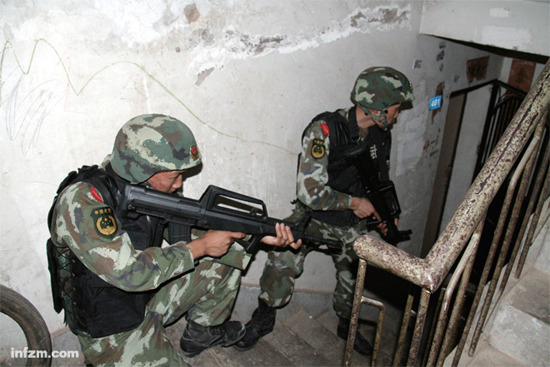
The anti-drug police are waiting for command during a covert operation in Yunnan Province. In recent years, armed drug trafficking has become a growing threat in the "Golden Triangle."
(Ecns.cn) -- China has remained steadfast in its anti-drug battle for the last three decades, and has never stopped exploring new ways to crack down on drug traffickers and their changing tactics, says the Southern Weekly.
In 2011, the Yunnan Frontier Corps seized 4.18 tons of narcotics in the province's Xishuangbanna prefecture, a figure exceeding the total amount seized over the past six years. In addition, there were 86 big cases that each involved more than 10 kilograms of drugs last year, far exceeding anything accomplished prior to 2008.
Chinese anti-drug police have proven themselves capable when carrying out dangerous missions that put their lives at risk, the newspaper adds, but with drug crimes seeing an upward trend in recent years, they are facing ever greater peril.
Armed trafficking
On February 23, 2012, anti-drug policeman Ke Zhanjun died after being shot in the head and chest during a covert operation to apprehend drug dealers in Jinghong, Yunnan Province.
Ke was only 30 years old, and one of the younger members of the Xishuangbanna Public Security Bureau.
According to Hu Zujun, head of Yunnan's Narcotics Control Bureau, armed drug trafficking has become a growing threat in the "Golden Triangle," an area in Southeast Asia notorious for its illegal opium production.
Before 2008, there were only two to three cases of armed drug trafficking in Xishuangbanna, but in recent years that number has been climbing. In 2011 alone, there were 13 cases of armed drug trafficking in the area, said Hu.
On May 10, 2012, Jai Norkham, a notorious Golden Triangle drug lord, was brought to Beijing from Laos to face questioning for his role in the murder of 13 Chinese crew members on the Mekong River in Thailand last year.
Hu said Norkham was equipped with modern weapons that far exceeded their expectations. Over the years, Myanmar, Laos and Thailand have carried out their own crackdowns on Norkham, but all failed because he is very cunning, Hu said.
Yunnan's anti-drug team has gone up against many different gangs, but a drug trafficking group like Norkham's is particularly hard to stop, he added.
China's first anti-drug team was set up in Yunnan Province in 1982 and consisted of 1,000 policemen. 30 years later, there are now a total of 24,000 anti-drug cops across the country, and their job is harder than ever.
Synthetics
Around year 2000, a new breed of illicit drugs emerged worldwide that have since become viewed as a major threat to China's national security, economy and stability.
In 2010, crystal methamphetamine overtook heroin to become the top illegal drug of choice for the first time in Yunnan Province. That year, the quantity of crystal meth seized in Yunnan was about 51 percent of the total amount of illicit drugs seized in the province; in 2011, the percentage was up to 60 percent, according to the Southern Weekly.
Such synthetic drugs are usually produced in clandestine laboratories, with crystal meth, ecstasy, ketamine and triazolam among the most popular.
In China, the number of abusers of synthetic drugs is increasing. In 2008, about 18 percent of arrested drug abusers took synthetic rather than traditional drugs. That amount rose to 28 percent in 2010.
Moreover, ecstasy use has increased among youth in nightclubs and karaoke bars in large cities and areas along the country's wealthy coast, particularly in Shanghai, Nanjing, Guangzhou, Shenzhen and Beijing.
Chen Cunyi, deputy director of the Ministry of Public Security's Narcotics Control Bureau, said this has much to do with the country's anti-drug efforts, which have limited the planting of opium poppy and led to a drop in the production of traditional drugs.
Chen also noted that many young people prefer the new drugs, and that some even mistakenly think that synthetic drugs are not harmful to their health. He cited as an example a truck driver who often used crystal meth to keep him awake during long drives.
Within and without
China experienced 30 drug-free years prior to the reform and opening up in 1978, after which the drug problem started to plague the country once again.
At the beginning drug sources all came from abroad, scattered at the Golden Triangle. To address the situation, in the 1990s China conducted research into drug eradication methods and later tried an opium poppy alternative campaign.
By providing seeds, technology and funding to farmers in neighboring countries, China encouraged them to plant crops other than opium poppy.
This method functioned for about a decade. But because there were few follow-up measures to help the farmers upgrade their agricultural businesses, the majority gave up in the end and turned back to planting poppy.
With yields of opium poppy rising in recent years, the quantity of illicit drugs produced in the Chinese mainland is also increasing, which means the limited number of anti-drug policemen will be challenged, notes the Southern Weekly.
In 2011, the amount of heroin seized in China reached 5.1 tons, up 55 percent year on year; crystal meth reached 7.9 tons, up 62 percent.
Chen said China will continue to strengthen efforts to fight drug crimes despite various difficulties and challenges, adding that the "the priest will climb 10 posts while the devil climbs one."

Copyright ©1999-2011 Chinanews.com. All rights reserved.
Reproduction in whole or in part without permission is prohibited.